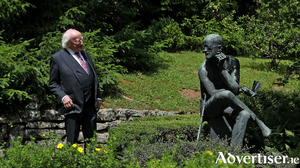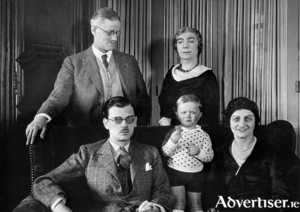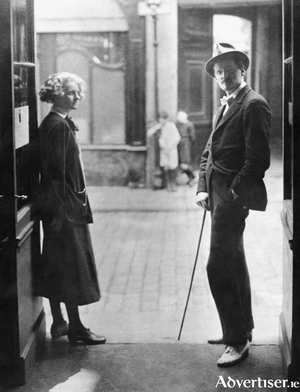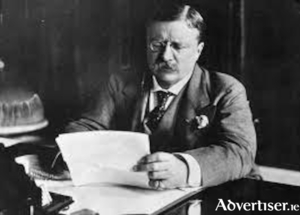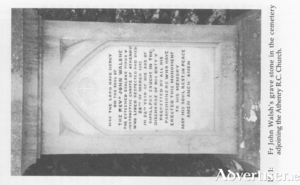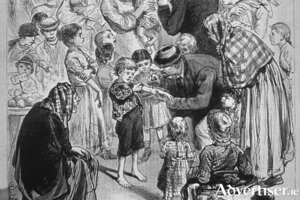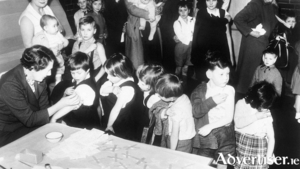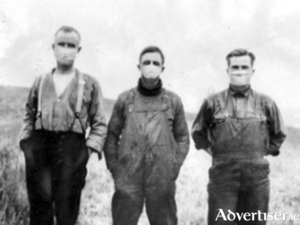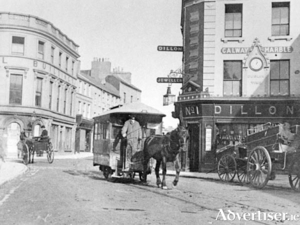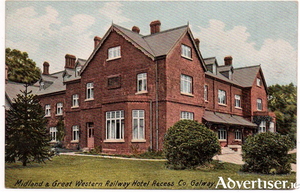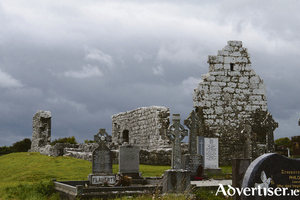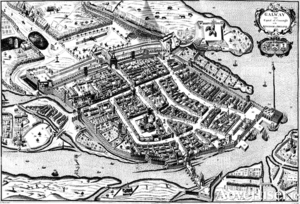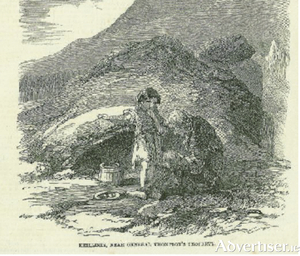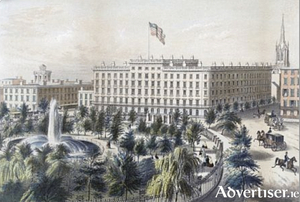The Shawl of Galway Grey
Thu, Apr 21, 2022
The murderous and vengeful events that followed 'Bloody Sunday' 1920 impacted on the town of Clifden in an unexpected way. There was shooting and murder on its streets; and, following a rampage by the Black and Tans, practically half the town was burnt down.
It began in Dublin early on the Sunday morning November 21. Michael Collins' deadly plan to wipe out the so-called Cairo Gang, stooges and spies of Dublin Castle, was ruthlessly put into effect. IRA teams shot dead 13 people and wounded six. One IRA member, Frank Teeling, was captured, but he escaped.
Read more ...‘My dear little runaway Nora..’
Thu, Apr 14, 2022
Like all widows Nora had barely time to grieve. There was so much to be done. Both she and Giorgio and her grandson Stephen, were in a state of shock at Joyce’s sudden death. Joyce suffered indifferent health all his adult life, and endured a series of painful eye operations which had little effect on his looming blindness.
Read more ...A story of two fathers and two children
Thu, Apr 07, 2022
The final chapter in the history of Shakespeare and Company, the famous Paris bookshop, began with the publication of James Joyce’s Finnegans Wake, in May 1939. The shop closed in December 1941 when a Nazi officer saw a copy of Joyce’s book in its window and asked to buy it. Sylvia Beach refused saying it was her only copy, and was not for sale. The officer threatened to return and confiscate her entire stock, and left. He returned the next day and demanded she sold him the book. Again Sylvia refused, and the officer, ‘trembling with rage’ warned that he would be back that afternoon and seize all her books.
Read more ...Two weddings and a broken young girl
Thu, Mar 31, 2022
There has never been a concentration of outstanding literary and artistic talent such as that in the Paris of the 1920s. The city heaved with outrage and ecstasy at the paintings of Piccaso, and Henri Matisse, the music of Igor Stravinsky, and the wild dancing of Joséphine Baker at the Folies Bergere, and the most extraordinary avant-garde literature, where new boundaries were created by a wave of modernist writers, the most celebrated being James Joyce.
Read more ...‘That Mr James Joyce is a man of genius’
Thu, Mar 24, 2022
Returning to Paris after an unsuccessful and troublesome visit to Galway in April 1922, Nora and her two children, Georgio (17) and Lucia (15) became aware that fame had come to the Joyces. Three months after its publication, Ulysses was recognised as a work of genius.
Read more ...The story of the watch at Kiltartan
Wed, Mar 16, 2022
Gregory stayed at the Algonquin Hotel, on 44th Street, a few blocks from the Maxine Elliott Theatre where JM Synge’s play The Playboy of the Western World, opened on Monday November 27 1911. This was the Abbey Theatre’s first tour of America, and it was much anticipated. But its opening night was brought to a standstill by riotous and disruptive behaviour by a yahoo Irish element, who objected to its depiction of Irish womanhood. The play continued only after the police dragged off the worst offenders to jail.
Read more ...A former president learns a lesson about theatre craft
Thu, Mar 10, 2022
Nothing shut the mouths of the Irish yahoos faster than to see Augusta Lady Gregory enter the Maxine Elliot Theatre, New York, arm in arm with Teddy Roosevelt, probably America’s greatest president. Their jaws must have hit the floor in amazement as they were well prepared for a total assault on the Abbey Theatre’s presentation of the Playboy of the Western World, and on its ‘pensioner’ spokesperson Lady Gregory.
Read more ...How Athenry recovered from its smallpox epidemic
Thu, Mar 03, 2022
The public sanitary conditions in Athenry, were regarded as a disgrace, and not conducive to a healthy environment when an epidemic of smallpox erupted there in the spring of 1875.
Read more ...Breakthrough at last in desperate search for a hospital
Thu, Feb 24, 2022
With smallpox sufferers in make-shift refuges such as out-buildings, rooms in the Loughrea barracks, and in sheds outside Dr Leonard’s home, all hopes are placed on the ready-made iron hospital ordered from Messrs Braby and Co. London. The hospital was to accommodate 12 patients, but already within five weeks of the first case being reported in Athenry, there were 20 cases of smallpox, three of whom had died.
Read more ...Smallpox patient sparks riot in Loughrea
Thu, Feb 17, 2022
The initial refusal by the Loughrea Workhouse hospital to accept smallpox patients was smartly over ruled by the Local Government Board (LGB). It suggested that some out-houses or offices, at the hospital, could be converted to receive the patients while keeping them separate from the other sick. It was satisfied that the resident doctor there, Dr Lynch, ‘will afford valuable advice and assistance’. The board warned that it was essential smallpox sufferers were kept isolated from other people. However, the Loughrea Board of Guardians, with responsibility for the hospital, did not heed the rebuke.
Read more ...March 1875 - Smallpox in Athenry
Thu, Feb 10, 2022
On March 2 1875, the medical officer of the Athenry Dispensary District, Dr WJ Leonard, wrote an urgent letter to the Local Government Board (LGB) in Dublin, regretting to report a ‘very bad case of smallpox’ which had come into his district the previous day. He briefly described how it was discovered:
Read more ...The end of the line
Thu, Feb 03, 2022
Fifteen years before the Galway-Clifden railway started, the first light-rail track laid in Galway was the tram service to Salthill. For more than 39 years a series of horse-drawn trams ran from the depot in Forster Street, along the east and south sides of Eyre Square, heading west through Shop Street and Dominick Street, over the bridge, and along the Salthill road. Then it was in the countryside with open fields and thatched cottages. The line came to an end at the Eglinton Hotel (now a hostel), where the horse was switched to the other end of the tram for the return journey. The Eglinton became Europe’s most westerly tram terminus.
Read more ...How Galway lost the Clifden railway
Thu, Jan 27, 2022
It is probable that if the coastal route had been chosen for the Clifden railway, rather than the Oughterard/ Maam Cross way, the line would still be viable today. The idea of the so-called ‘Balfour lines’, proposed by an enlightened chief secretary for Ireland, Arthur J Balfour, and given the go-ahead in the 1889 Light Railways (Ireland) Act, was to give far-flung towns and communities access to bigger markets, and to grasp the benefits of employment and opportunities.
Read more ...‘I met Mary Hynes at the cross of Kiltartan - and fell in love with her there and then…’
Thu, Jan 20, 2022
One of the attractions for WB Yeats, when he was considering buying the old Norman tower at Ballylee, was that the surrounding countryside echoed with stories of Antoine Ó Raifteiraí (1799-1835), the blind minstrel, who frequented the south Galway area.
The poet Ciarán O Coigligh tells us that Ó Raifteiraí’s verses arise directly from the circumstances of his own life, and those of the people among whom he lived: ‘Pre-famine Ireland, densely populated, unruly, dangerous, but energetic, is vividly portrayed.’
Read more ...Tragedy at Annaghdown prompts a strange fairy visit
Thu, Jan 13, 2022
‘My father had a sister Bríd. She was a beautiful woman when she was young. She was friendly with Jack (Seán) ‘ac Coscair, but her father never knew they had spoken a word to each other. It was Bríd who used to rake the fire and close the door each night. She raked the fire and closed the door that night, and she went to bed. She was only a short time asleep when a sinneán (strong gust of wind) came, and the door was blown in against that wall below. ‘Get up, Bríd,’ said her father, ‘and close the door!’
Read more ...‘An unbroken history of more than one hundred years’
Thu, Jan 06, 2022
In 1831 Patrick Broderick, from Loughrea, was charged with insurrectionary crimes at the Galway Assizes, and cruelly sentenced to spend the rest of his life in a criminal colony ‘beyond the seas’ in New South Wales, Australia. He was barred from ever returning to his native land. His wife Mary, son John and daughters Ann and Catherine, were left destitute on the infamous Clanricarde estate, one with more than 2,000 tenants.
Read more ...The little miracle that saved Galway Arts Festival 1985
Thu, Dec 23, 2021
It seems laughable today but in 1958 Archbishop John Mc Quaid of Dublin, obsessively monitored Irish life to the extent, that he did not have to ban a film, book or play outright, it was sufficient for his secretary to make it known that the archbishop had wondered if that (name of film, book or movie) was the sort of thing a good Catholic should witness.
Read more ...Connemara after the Famine
Thu, Dec 16, 2021
Following the inability of Tom Martin and his daughter Mary, the Princess of Connemara, to meet the debts on their vast encumbered estate, they were sued by the Law Life Assurance Society and ordered to sell it in its entirety.
Read more ...‘Can any romance equal the romance of real life?’
Thu, Dec 09, 2021
After her Connemara tour Maria Edgeworth kept up a correspondence with the Martins. She followed their fortunes and misfortunes with all the attention of an enthralled novel-reader. There was plenty to hold her attention. In the spring of 1835 the Martins travelled to London where Mary was presented at court and moved in fashionable society, attending dinner parties and charity events, of which a cynical Lord Byron remarked that these galas were nothing less than a marriage market.
Read more ...‘One of the most extraordinary persons’ Maria Edgeworth ever met
Thu, Dec 02, 2021
As the legendary Colonel Richard Martin neared the end of his life in Boulogne, where he had fled to escape his numerous creditors, a large four-horse carriage, on which two postilions, in jackets of dark-blue frieze, guided the coach on horse-back, arrived at the front door of Ballynahinch. It was dark, and its occupants were in a state of near exhaustion.
Read more ...